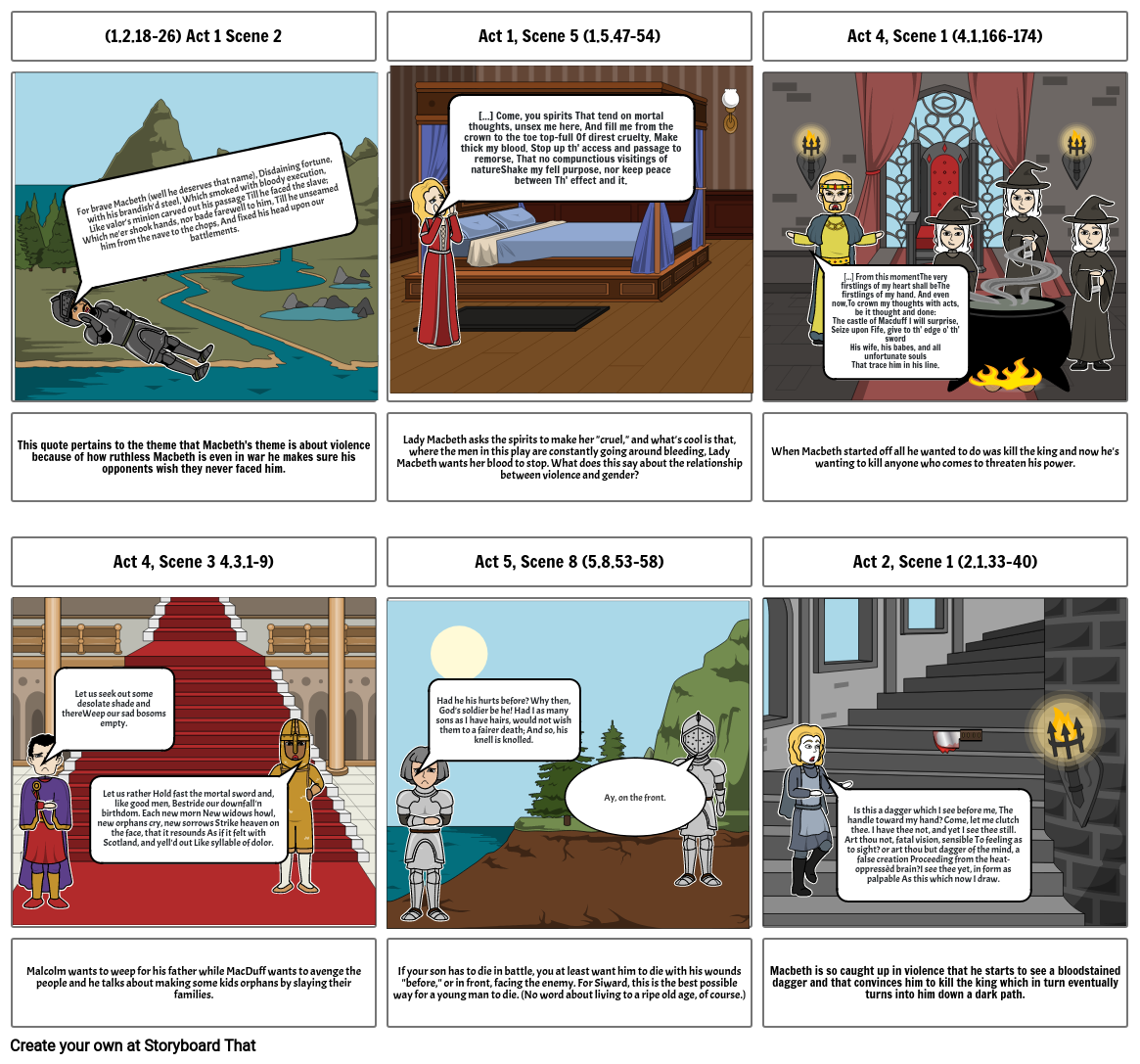Macbeth Storyboard

Storyboard Szöveg
- (1.2.18-26) Act 1 Scene 2
- For brave Macbeth (well he deserves that name), Disdaining fortune, with his brandish'd steel, Which smoked with bloody execution,Like valor's minion carved out his passage Till he faced the slave; Which ne'er shook hands, nor bade farewell to him, Till he unseamed him from the nave to the chops, And fixed his head upon our battlements.
- Act 1, Scene 5 (1.5.47-54)
- [...] Come, you spirits That tend on mortal thoughts, unsex me here, And fill me from the crown to the toe top-full Of direst cruelty. Make thick my blood. Stop up th' access and passage to remorse, That no compunctious visitings of nature Shake my fell purpose, nor keep peace between Th' effect and it.
- Act 4, Scene 1 (4.1.166-174)
- [...] From this momentThe very firstlings of my heart shall beThe firstlings of my hand. And even now,To crown my thoughts with acts, be it thought and done:The castle of Macduff I will surprise,Seize upon Fife, give to th' edge o' th' swordHis wife, his babes, and all unfortunate soulsThat trace him in his line.
- This quote pertains to the theme that Macbeth's theme is about violence because of how ruthless Macbeth is even in war he makes sure his opponents wish they never faced him.
- Act 4, Scene 3 4.3.1-9)
- Let us seek out some desolate shade and thereWeep our sad bosoms empty.
- Lady Macbeth asks the spirits to make her "cruel," and what's cool is that, where the men in this play are constantly going around bleeding, Lady Macbeth wants her blood to stop. What does this say about the relationship between violence and gender?
- Act 5, Scene 8 (5.8.53-58)
- Had he his hurts before? Why then, God's soldier be he! Had I as many sons as I have hairs, would not wish them to a fairer death; And so, his knell is knolled.
- When Macbeth started off all he wanted to do was kill the king and now he's wanting to kill anyone who comes to threaten his power.
- Act 2, Scene 1 (2.1.33-40)
- Malcolm wants to weep for his father while MacDuff wants to avenge the people and he talks about making some kids orphans by slaying their families.
- Let us rather Hold fast the mortal sword and, like good men, Bestride our downfall'n birthdom. Each new morn New widows howl, new orphans cry, new sorrows Strike heaven on the face, that it resounds As if it felt with Scotland, and yell'd out Like syllable of dolor.
- If your son has to die in battle, you at least want him to die with his wounds "before," or in front, facing the enemy. For Siward, this is the best possible way for a young man to die. (No word about living to a ripe old age, of course.)
- Ay, on the front.
- Macbeth is so caught up in violence that he starts to see a bloodstained dagger and that convinces him to kill the king which in turn eventually turns into him down a dark path.
- Is this a dagger which I see before me, The handle toward my hand? Come, let me clutch thee. I have thee not, and yet I see thee still. Art thou not, fatal vision, sensible To feeling as to sight? or art thou but dagger of the mind, a false creation Proceeding from the heat-oppressèd brain?I see thee yet, in form as palpable As this which now I draw.
Több mint 30 millió storyboard készült

